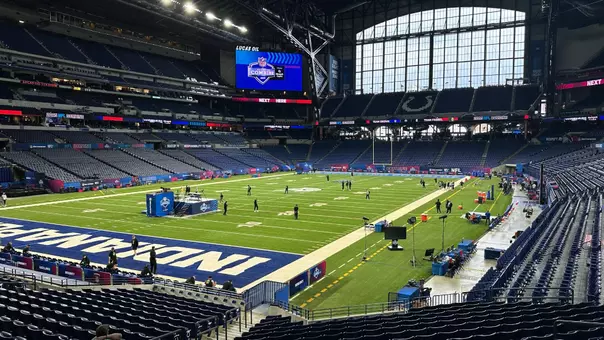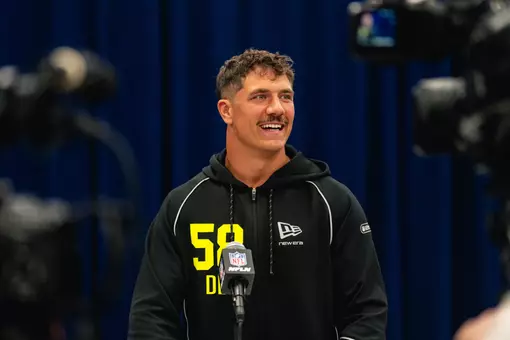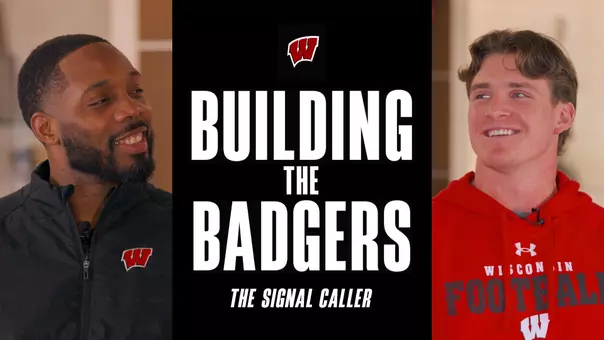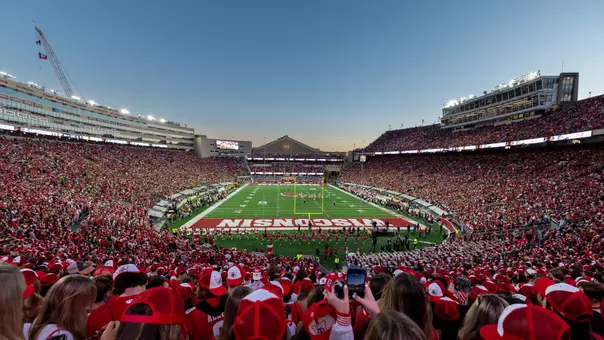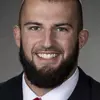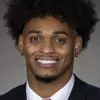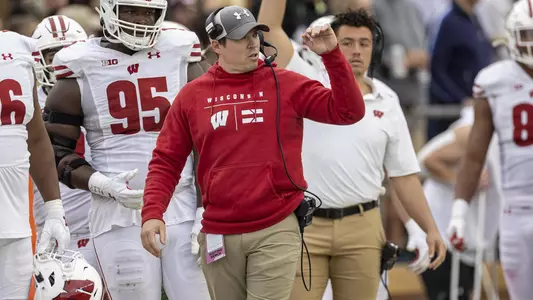
Lucas: Leonhard makes confidence contagious on nation’s No. 1 defense
November 18, 2021 | Football, Mike Lucas
Leaning into experience and empowering playmakers has powered Badgers’ historic performance
BY MIKE LUCAS
UWBadgers.com Senior Writer
MADISON, Wis. — The picture is one of Jim Leonhard's most prized keepsakes from his 10-year playing career in the National Football League. It was taken during a 2010 divisional playoff game between the New York Jets and San Diego Chargers. It captures the essence and fire of a competitor.
Leonhard, the Jets defensive signal-caller, broke on quarterback Philip Rivers' pass and dislodged the ball from the hands of wide receiver Malcolm Floyd. Despite losing his helmet, the 5-foot-8, 185-pound Leonhard pounced on what he thought was a fumble. It was ruled an incomplete pass.
While diving on the ball, Leonhard inadvertently got kicked in the back of the head. After watching the film, he saw that it was "friendly fire" off the foot of his teammate, linebacker Bart Scott. Leonhard's fearlessness prompted fellow safety Kerry Rhodes to say, "That's the stuff of legends."
The picture of the helmetless Leonhard — giving maximum effort — frames who he is.
"It's one I'm proud of, for sure," he said. "To me that was just a style of play. That was my mentality playing — whatever it takes, by any means necessary. That's how I prided myself on playing. That picture kind of signifies what my thought process was playing the game of football."

In that same game, Leonhard lost his helmet again after picking off Rivers on what was a momentum-changing interception that led to the go-ahead touchdown in the 17-14 upset. Jets head coach Rex Ryan didn't mince words afterwards, "I think everyone knows the kind of player he is now."
New Yorkers came to appreciate Leonhard's grittiness. In the 2011 opener, he chased down Dallas tight end Jason Witten in the fourth quarter — sprinting more than 40 yards to knock him out of bounds on the Jets' 3-yard line to prevent Whitten from scoring. The Cowboys fumbled three plays later.
Instead of facing a 14-point deficit, the Jets rallied around Leonhard's hustle for a comeback win. Leonhard later explained, "It was one of those plays where you just keep running because you never know what might happen. We always have a saying, 'They're not in (the end zone) until they're in.'"
• • • •
Since transferring from the University of Houston to Wisconsin three years ago, safety Collin Wilder has bought into Leonhard's sayings and coaching. It's why he states without reservation, "In my own personal journey, the way I was able to bounce back and love football again is because of him."
Whenever visiting Leonhard's home, he's always drawn to that picture hanging on the wall.
"I love looking at that picture, it's so gritty," said Wilder, the creator of the Grit Factory theme that UW's turnover-crazed defense has embraced. "Being out there with his helmet off going for a fumble proved he loves this game. You can't do anything but respect what he has to say and how he coaches."

What Leonhard learned as an undersized, overachieving player has carried over to coaching. Though only 39, he was a late bloomer in the profession. After his retirement from the NFL as a player, he took a year off to chart his next path. Schooling others on the game was a natural progression.
"You're always trying to get guys to take ownership," he said, "and have the confidence that, 'It's not the play, it's me, it's my technique, it's my understanding of the game and our scheme and what we're asked to do, play-in and play-out.' It's really owning the details to make it work.
"Players make the plays, and you have to empower them that way. There's a lot of people doing things close to what we're doing (at UW) and there's mixed success. The players have to finish — they have to go out there and make it happen and communicate it and execute the game plan.
"If you can get that across to your guys — to have that ownership, to have that confidence in what you're asking them to do — that's very powerful."
Defensively, the Badgers have overpowered most offenses. They lead the FBS in total defense and rushing defense and rank No. 2 in passing defense and scoring defense. They've allowed just 12 touchdowns in 10 games — none the last nine-plus quarters (dating to the third quarter of the Iowa win).
"Number one, they're a very confident group," Leonhard said. "They have a ton of experience. There are a lot of guys who have played together for a long time, so they have confidence in each other. They have a very good understanding of what we do, and they really enjoy playing off of each other.
"It's cool to watch because as a coach you're trying to get an understanding with your players. In-between those white lines, you've got that 11, right? You have to communicate; you have to own the intensity and the style of play and what those standards are. That doesn't come from the sidelines.
"Our guys get that. And we have a number of players who do a great job of holding each other accountable in trying to set the standard themselves, not just live up to it."

Coming into the 2021 season, Leonhard sensed that he had all the right pieces in place. That included four "super seniors" on defense taking advantage of a sixth year of competition: Wilder, outside linebacker Noah Burks, cornerback Caesar Williams and backup inside linebacker Mike Maskalunas.
"I knew we had a talented group; I knew we had an experienced group," he said. "You're always trying to identify the playmakers and we had a number that had done it before. It was not like you had a bunch of guys where you're saying, 'I think we're ready to take this jump …'
"There were a couple of young guys and even older guys where you could see physically had taken a big step, which was huge to see, which just makes us more flexible in what we're allowed to do. We were able to attack in new and creative ways when you see guys elevate their game."
Last Saturday, Northwestern's first offensive possession was out of character for Leonhard's defense. The methodical Wildcats drove 82 yards on 19 plays and burned 7 minutes and 43 seconds off the clock before Williams' end-zone interception ended the series and restored some normalcy.
"To me, it was sloppy, it wasn't up to our standard," Leonhard critiqued. "The communication wasn't great from sideline to field, and we had to figure that out. For whatever reason, it was issues that we weren't having in other games and just execution and physicality.
"You hit the ball carrier at two (yards) and he went for five. Stuff like that. It just didn't feel like us. And it seemed like it took us making a play in order to wake up. After that first drive, after we got the interception, everything fell into place and guys really gained confidence in playing fast and aggressive."
• • • •
Beyond the national championship hopes that an unbeaten Wisconsin team carried into the 2004 game against Minnesota at Camp Randall Stadium, there was the matter of getting back Paul Bunyan's Axe, which had been turned over to the Gophers the year before after a loss in Minneapolis.
Leonhard will never forget the feeling of running down the tunnel prior to the opening kickoff for the aforementioned reasons, plus the fact that it was his final home appearance as a Badger. Leonhard was one of 24 seniors — one of seven that had started more than 30 career games.
Joining the All-America safety on that list were defensive stalwarts like Scott Starks, Anttaj Hawthorne, Jason Jefferson, Erasmus James, Jonathan Welsh and Robert Brooks. Also recognized during the pregame ceremony were backup nose tackle Kalvin Barrett and backup O-lineman Jake Wood.
Both went on to gain more notoriety outside of football. In April, Gov. Tony Evers appointed Barrett as the Dane County sheriff. Wood, an ex-Marine, is the founder and CEO of Groundswell, a venture backed software company, and the executive director of Team Rubicon, which he co-founded.
"I have some really good memories playing with that group; they were some of my best friends and I just really grew up as a Badger (with them)," said Leonhard, who was surprised by the emotion of Senior Day. "It kind of hit me a little unexpected. I'm not that emotional of a guy. I didn't feel like I was.
"But once you get to the stadium and realize you're doing things for the last time, and you see your parents out on the field and every sacrifice they've made," he said of greeting Don and Debbie Leonhard, who nicknamed their middle child of three boys "Jumpin' Jimmy" for his athletic prowess.

Make no mistake, he was a coach's kid. Don coached basketball and baseball. Debbie coached basketball and volleyball. He was nurtured on competition in Tony, Wisconsin (population: 102), where a billboard stands out of civic pride to honor his journey from walk-on to three-time All-American.
But as Leonhard was preparing to run out of that tunnel one last time in his UW uniform, bearing No. 18 (which Wilder now wears), he was facing the unknown regarding his future and asking himself, "'How many more of these do I have left?' — those thoughts were going through my head."
There was no suspense in the outcome that day. Wisconsin scored on five straight marches to take a 31-0 lead and reclaimed the Axe after a 38-14 beatdown of Minnesota. Leonhard had three tackles, one of which was a resounding hit on 6-6, 270-pound tight end Matt Spaeth.
While improving to 9-0, the Badgers remained No. 5 in the Bowl Championship Series Standings behind USC, Oklahoma, Auburn and Cal. They were No. 4 in the AP and coaches polls. But a dream season morphed into a nightmare. They lost their last three games, including the Outback Bowl.
Seventeen years later, Leonhard may choose to share his Senior Day experiences with the upperclassmen prior to Saturday's matchup with Nebraska. The stakes are high since the Badgers are on a six-game winning streak and hunting a Big Ten West Division title and trip to Indianapolis.
"To me, don't try to avoid it," Leonhard of the emotional backdrop. "It's either going to be there during the pregame or at some point. I remember guys getting on the field for that first play and, all of a sudden, they lose their mind. These are the same guys who say, 'I'm not going to be that guy.'
"But it is an emotional day. It's a big moment. It's a lot of stuff culminating in your final game at Camp Randall. Lean into it, man. And embrace it. And then go out there and really leave your mark."
Leonhard has on this Wisconsin defense.
As a result, he has been named a candidate for the Broyles Award honoring the No. 1 assistant coach in college football (18 of the previous 23 winners have gone on to be head coaches. Topping that list are Georgia's Kirby Smart and Oklahoma's Lincoln Riley).
"If you look at the numbers since he's gotten here, since he has become the defensive coordinator, he's only made us better," said Wilder, making an argument for Leonhard, a 2017 Broyles finalist. "If you look at this year, and the production this defense has had, it's consistent.
"That's probably the best way to describe Coach Leonhard. He's consistent in everything that he does. I'm so grateful that I get to be coached by him. Pretty much the player I became, the player that I am, is because of him. I really owe him everything. He's the real deal."

